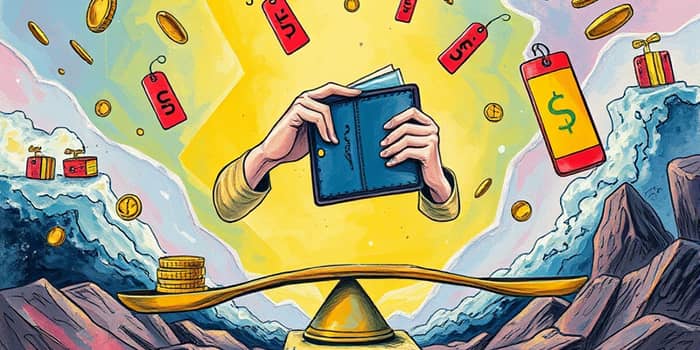Inflation affects every aspect of our financial lives, from erosion of purchasing power to the strategies we employ to protect our assets. Understanding this phenomenon is essential for making informed decisions and navigating uncertain economic times.
In this article, we dive deep into the definition, causes, effects, and practical steps you can take to safeguard your wealth against a persistent rise in general prices.
Understanding Inflation: Definition and Measurement
At its core, inflation is the steady rise in prices of goods and services that diminishes the value of money over time. Central banks and governments often measure inflation using indices like the Consumer Price Index (CPI) and Wholesale Price Index (WPI).
The CPI tracks a basket of commonly purchased consumer items, while the WPI measures price changes at the wholesale level. Together, they provide a snapshot of how rapidly prices change and how those changes ripple through the economy.
When inflation rises above the target range—commonly around 2% annually—households and businesses must adapt to altered cost structures, making robust financial planning strategies more important than ever.
Main Causes of Inflation
Inflation rarely arises from a single source. Rather, it reflects a combination of monetary, demand, supply, and psychological factors that drive prices upward:
- Monetary Expansion: An increase in money supply by central banks or through government spending.
- Demand-Pull Pressure: When consumer and business demand outpaces available goods and services.
- Cost-Push Factors: Rising wages or raw material prices that producers pass on to consumers.
- Built-In Expectations: Future inflation expectations that fuel wage demands and price hikes.
The Far-Reaching Effects of Rising Prices
Inflation’s impact extends well beyond the grocery line or the gas pump. One immediate consequence is the safeguard your purchasing power challenge. As prices climb, your paycheck or savings buys fewer goods, reducing real income.
For savers, inflation can erode the value of money held in accounts with low interest rates. Fixed-income investments, such as bonds, may deliver nominal returns that fail to keep pace with inflation, leading to negative real returns.
Borrowers may benefit from inflation because they repay loans with dollars that have less value than when they borrowed. However, lenders often adjust interest rates to compensate, creating a complex interplay of winners and losers.
This table illustrates how even moderate inflation over decades can erode the real value of wages and everyday purchases.
Inflation in Daily Life: Real-World Examples
From your grocery bill to your utility or mortgage payments, inflation shapes everyday costs. Here are some concrete examples:
- Grocery prices climbing faster than take-home pay, making basic staples more expensive.
- Fuel and energy bills rising intermittently due to geopolitical tensions and supply constraints.
- Variable-rate mortgages and loans becoming costlier when central banks hike interest rates to cool inflation.
- Subscription services and digital goods gradually increasing fees each year.
These examples highlight how a dynamic economic environment can influence household budgets and spending choices.
Strategies to Protect Your Wealth
Proactive planning is the best defense against inflation’s corrosive effects. Consider these approaches:
- Invest in inflation-protected securities: Treasury Inflation-Protected Securities (TIPS) and similar assets adjust principal value based on price indices.
- Hold a diversified portfolio of inflation hedges: Real estate, commodities like gold, and certain stocks often outpace inflation.
- Increase earnings potential: Upskilling, side businesses, or negotiating raises can help your income keep pace with rising costs.
- Maintain an emergency fund with flexibility: Keep a liquid buffer but balance it with higher-yielding assets.
- Monitor and adjust spending habits: Identify discretionary expenses to trim and prioritize essential outlays.
By combining strategic allocation of investment assets with disciplined budgeting, you can mitigate the impact of price surges on your net worth.
The Role of Monetary Policy
Central banks wield tools such as interest rate adjustments and open market operations to influence inflation. Raising rates can curb excessive borrowing and spending, tempering price pressures.
Conversely, lowering rates can stimulate economic activity during periods of low inflation or deflation risk. Striking the balance between economic growth and price stability remains a core challenge for policymakers worldwide.
Looking Ahead: Balancing Risks and Opportunities
While high inflation can undermine confidence and distort planning, moderate inflation is often viewed as a sign of a growing economy. The key is understanding where risks lie and where opportunities emerge.
For savers and investors, this might mean rebalancing portfolios to include assets that historically perform well during inflationary cycles, such as certain real assets or dividend-growing equities.
For consumers, the emphasis is on prudent spending, building reserves, and staying informed about economic trends that may affect wages and costs.
Key Takeaways
Inflation is an unavoidable force in modern economies, but it need not catch you unprepared. By grasping its causes and recognizing its effects on your day-to-day finances, you can adopt measures to preserve and grow your wealth.
Whether through investing in inflation-protected instruments, diversifying assets, or honing your monetary habits, the strategies outlined here empower you to face rising prices with confidence and foresight.
References
- https://www.investopedia.com/terms/i/inflation.asp
- https://en.wikipedia.org/wiki/Inflation
- https://www.youtube.com/watch?v=HQ-Kg_xgdhE
- https://gisme.georgetown.edu/news/what-the-hell-is-inflation-anyway/
- https://www.mckinsey.com/featured-insights/mckinsey-explainers/what-is-inflation
- https://www.jrmartincpa.com/how-does-inflation-influence-purchasing-power/
- https://www.equifax.com/personal/education/personal-finance/articles/-/learn/what-is-inflation/
- https://www.newyorklife.com/newsroom/inflation-explained










